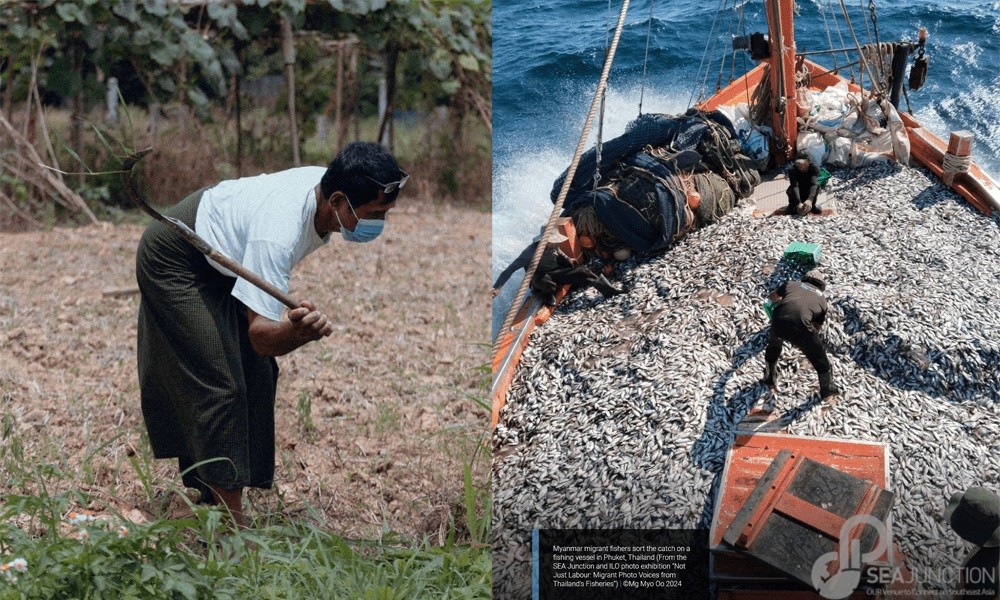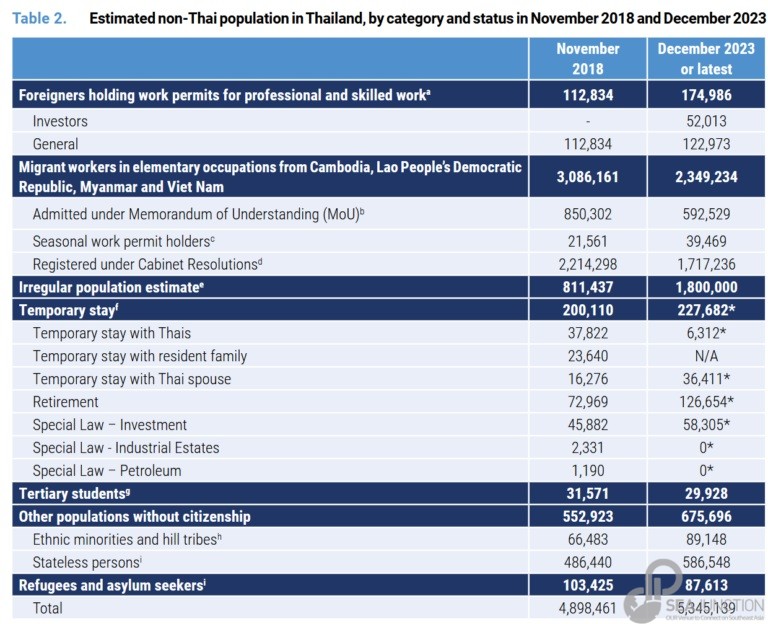 Migration remains a cornerstone of Thailand’s socio-economic development, offering immense opportunities when well-managed and when the rights of migrants are safeguarded, according to the Thailand Migration Report 2024.
Migration remains a cornerstone of Thailand’s socio-economic development, offering immense opportunities when well-managed and when the rights of migrants are safeguarded, according to the Thailand Migration Report 2024.
Released on 13 December 2024 by the United Nations Network on Migration (UNMN) in Thailand, the sixth edition of this report provides a detailed analysis of migration trends, challenges, and solutions for sustainable development. The previous version was published in 2019.
The report reflects the collaborative efforts of nine UN agencies, highlighting migration across five key themes: inclusion, working conditions, human rights and access to justice, social protection, and healthcare.
It aims to provide policymakers and stakeholders with evidence-based insights and actionable recommendations to enhance migration governance.
Thailand as a regional migration hub
Thailand hosts over 5.3 million non-Thai nationals, marking a notable rise from 4.9 million in 2019. As a leading migration hub in Southeast Asia, the country attracts migrant workers, refugees, asylum seekers, and trafficked persons, predominantly from neighbouring nations such as Cambodia, Lao People’s Democratic Republic, and Myanmar.
In addition to being a destination country, Thailand serves as a transit hub for migrants moving further into the region and beyond. It also sends thousands of Thai workers overseas annually, reflecting the complex dynamics of migration within and from Thailand.
Michaela Friberg-Storey, UN Resident Coordinator in Thailand, emphasised the dual nature of migration, stating, “This report is a comprehensive stocktake of the opportunities migrants bring and the challenges they face. It highlights Thailand’s critical role as a Champion Country of the Global Compact for Migration.”
 Labour migration: A pillar of economic growth
Labour migration: A pillar of economic growth
Labour migration from Cambodia, Lao People’s Democratic Republic, and Myanmar has been a significant driver of Thailand’s economic growth, particularly in sectors such as construction, manufacturing, agriculture, and services. The report notes that over 2.3 million registered migrant workers from these countries underpin Thailand’s labour-intensive industries, filling gaps left by the country’s ageing workforce.
Despite their contributions, many migrants face precarious conditions. Challenges include low wages, poor living and working environments, and limited access to social security and healthcare. Irregular migrants, in particular, are highly vulnerable to exploitation, trafficking, and human rights violations.
The report underscores the urgent need for expanded legal pathways to migration. “Comprehensive policies that ensure migrants can register, work decently, and access basic services are essential—not only to fulfil Thailand’s commitments but also to sustain its economic resilience,” said Géraldine Ansart, Chief of Mission at IOM Thailand.
Impact of crises on migration
The COVID-19 pandemic and political instability in neighbouring countries have significantly shaped Thailand’s migration landscape. Border closures and economic disruptions during the pandemic disproportionately affected migrants, particularly those in informal or irregular employment. Many lost their jobs, faced inadequate healthcare access, and endured unsafe living conditions.
Meanwhile, the ongoing conflict in Myanmar has led to a surge in irregular migration, with the number of Myanmar migrants in irregular situations doubling to 1.8 million since 2019. The report highlights the compounded challenges faced by these groups and calls for coordinated efforts to address their specific needs.
Policy recommendations and sustainable development
The Thailand Migration Report 2024 advocates aligning migration governance with the 2030 Agenda for Sustainable Development. It calls for stronger partnerships between governments, civil society, and private sector stakeholders to translate policy commitments into tangible actions that promote inclusivity and resilience.
Among its key recommendations are expanding regular migration pathways, improving access to healthcare and social security, and strengthening legal protections for migrants. These measures, the report argues, will not only safeguard migrants’ rights but also contribute to Thailand’s broader development goals, including its ambition to achieve high-income status by 2037.
The report also explores the contributions of women and children in migration, the impact of gender and socio-economic barriers, and the need for more robust protections against trafficking and exploitation. It highlights progress in areas such as birth registration for migrant children and the adoption of regional frameworks to address child statelessness.
A collaborative effort for change
Jointly authored by agencies including IOM, ILO, OHCHR, UNDP, UNFPA, UNICEF, UNODC, UN Women, and WHO, the Thailand Migration Report 2024 exemplifies inter-agency cooperation. Coordination and editing were led by Sally Barber and Dr Rosalia Sciortino.
“This report represents the collective effort of experts and practitioners committed to advancing migration governance in Thailand,” said Friberg-Storey.
As Thailand seeks to balance its economic reliance on migration with the need to uphold human rights and social protections, the report provides a roadmap for creating an inclusive, rights-based migration framework. It affirms that harnessing the potential of migration requires not only policy reform but also the active involvement of all stakeholders, from government institutions to civil society and the migrants themselves.
By addressing gaps in protection and expanding opportunities for regular migration, Thailand can transform its migration landscape into a model for sustainable development in the region.


